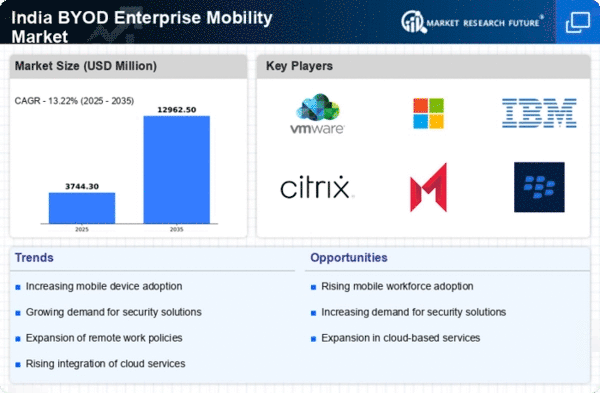Growing Mobile Workforce
The increasing number of mobile professionals in India is a key driver for the byod enterprise-mobility market. As organizations embrace flexible work arrangements, employees are utilizing personal devices for work-related tasks. This trend is evident in sectors such as IT and finance, where mobile workforces are projected to grow by 30% over the next five years. The demand for seamless access to corporate resources on personal devices is driving investments in mobile device management solutions. Companies are recognizing the need to implement policies that support BYOD initiatives while ensuring data security. This shift towards a mobile workforce is likely to enhance productivity and employee satisfaction, thereby propelling the growth of the byod enterprise-mobility market in India.
Cost Efficiency and Savings
Organizations in India are increasingly adopting BYOD policies as a means to reduce operational costs. By allowing employees to use their personal devices, companies can save on hardware expenses, which can be substantial. Research indicates that businesses can save up to 40% on device procurement and maintenance costs by implementing BYOD strategies. Furthermore, the reduction in IT support for company-owned devices contributes to overall cost efficiency. This financial incentive is a significant driver for the byod enterprise-mobility market, as organizations seek to optimize their budgets while maintaining productivity. The potential for cost savings encourages more companies to explore BYOD solutions, thereby expanding the market.
Enhanced Employee Satisfaction
The byod enterprise-mobility market is also driven by the desire for improved employee satisfaction. Employees prefer using devices they are familiar with, which can lead to increased comfort and productivity. Studies suggest that organizations that implement BYOD policies experience higher employee morale and retention rates. In India, where the workforce is becoming increasingly tech-savvy, the ability to choose personal devices for work purposes is appealing. This trend is likely to foster a more engaged workforce, as employees feel empowered to work in a manner that suits their preferences. Consequently, the emphasis on employee satisfaction is a crucial factor influencing the growth of the byod enterprise-mobility market.
Regulatory Compliance and Data Security
As data privacy regulations become more stringent in India, organizations are compelled to adopt robust security measures within their BYOD frameworks. Compliance with regulations such as the Information Technology Act and the Personal Data Protection Bill necessitates the implementation of secure access protocols and data management practices. This need for regulatory compliance is driving investments in security solutions tailored for the byod enterprise-mobility market. Companies are increasingly focusing on encryption, remote wipe capabilities, and secure access controls to protect sensitive information. The emphasis on data security not only mitigates risks but also enhances trust among stakeholders, thereby supporting the growth of the market.
Technological Advancements in Mobile Devices
The rapid evolution of mobile technology is a significant driver for the byod enterprise-mobility market. With advancements in device capabilities, such as improved processing power, enhanced security features, and better battery life, personal devices are becoming more suitable for professional use. In India, the proliferation of high-performance smartphones and tablets is facilitating the adoption of BYOD policies across various industries. As devices become more capable, organizations are more inclined to allow employees to utilize their personal technology for work purposes. This trend is likely to continue, as technological innovations further enhance the functionality and security of personal devices, thereby propelling the growth of the byod enterprise-mobility market.
















